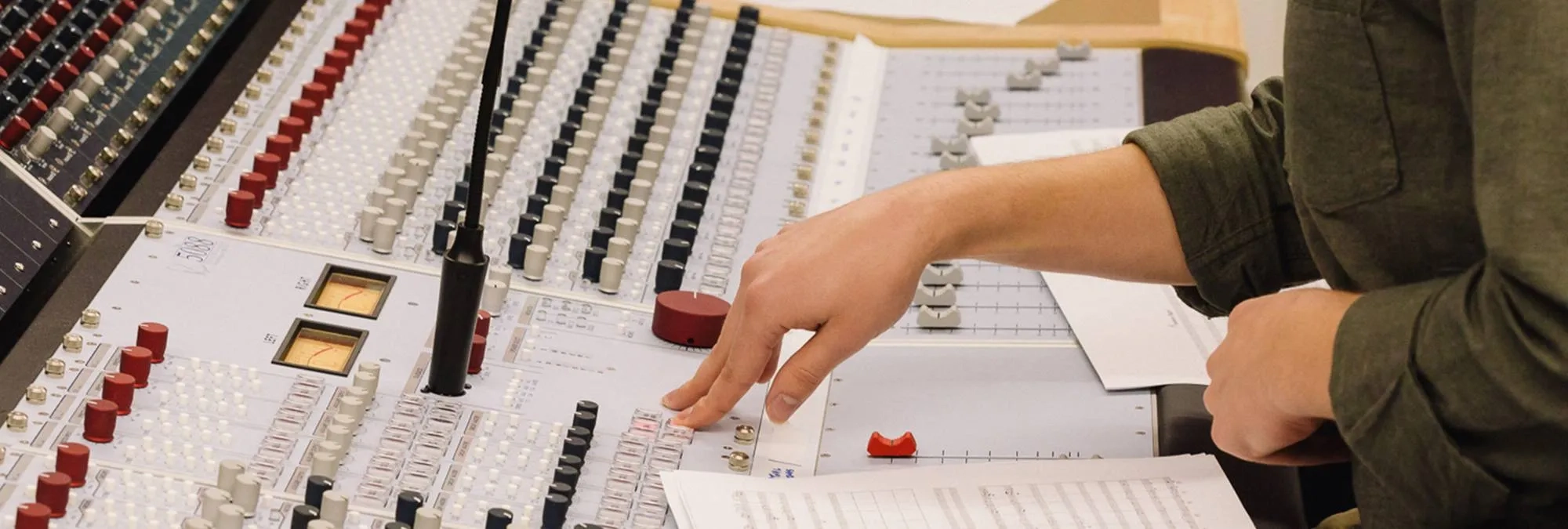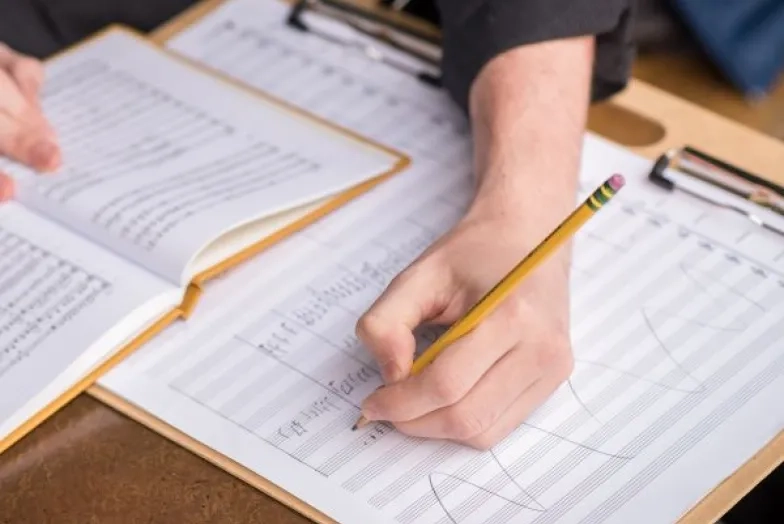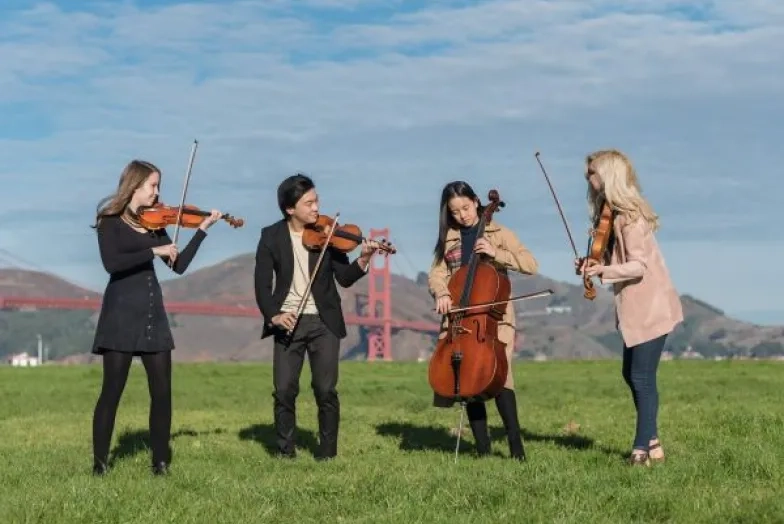TAC Professional Studies Certificate Curriculum
Collegiate Apply / Request Information
One could call TAC the perfect marriage of technology, classical musicianship, and experimentation."
— KQED, Northern California Public Broadcasting
Radically creative. Radically pragmatic.
A lot can happen in a year. As a PSC student in the TAC program, you will take an immersive selection of courses designed to provide you with the experiences and practice needed to succeed in an evolving industry.
Our interconnected courses are built to transform you intellectually, artistically, professionally, and individually. The Professional Studies Certificate (PSC) is a one-year, accelerated selection of courses from the TAC curriculum that focus specifically on industry-standard technologies and professional composition workflows. Students immersed in this program gain access and perspective on the bustling culture and industry of music for media that the Bay Area has to offer young professionals.
REQUIRED COURSES
Curriculum: Professional Studies Certificate in Technology and Applied Composition
Credit Total: 28
| Requirement | Cr. |
|---|---|
| Private Instruction | 4 |
| Game Scoring | 6 |
| Scoring for Film | 6 |
| Other TAC Coursework | 12 |
| Electives | 4 |
| Winter Term | 1 Year |
Required TAC Coursework
Scoring for Film
Game Scoring
Production Techniques in Logic Pro
Introduction to Sound Design
Max/MSP: Building Applications for Music
Introduction to Sound Recording
Introduction to Mixing
Private Composition Lessons
TAC Electives
Business for the Media Composer
Composer at the Keyboard
Computer Science for Musicians
Film Scoring: Tools, Techniques & Analysis
Technology and Applied Composition Course Descriptions
Scoring for Film
This course explores the history, aesthetics, and technique of composing music for films. Students will study how music in film creates a sense of dramatic structure, of time and place, of character, and what is unseen and unspoken, all in the service of telling a story. Emphasis is placed on film music's incorporation of folk music, popular music, 19th-century symphonic style, 20th-century modernism, jazz, minimalism, and pre-existing classical music.
Game Scoring
Basic techniques for implementation and industry workflows using middleware software such as Fmod and Wwise and Unity. Students learn how a game is scored and implemented into an interactive medium with professionally simulated workflows.
Production Techniques: Apple Logic Pro X
Students transfer their knowledge of Digital Audio Workstation functionality between platforms and expand beyond audio to MIDI, realizing techniques for traditional writing using the computer as a tool. Understanding workflow techniques, editing audio and MIDI, using software instruments, working with audio effects, mixing and automation, and the manipulation of pitch and time are covered in the course. Students will learn to edit to picture using Quicktime, as well as use Logic’s software instruments for synthesis, sampling, and sequencing.
Max/MSP: Building Applications for Music
Students learn techniques for using the computer for random, procedural, and generative operations to produce a custom music app in Max/MSP. Students are introduced to basic programming concepts in a visual object-oriented environment and gain an understanding of what it means to work in a nonlinear paradigm. In this instance, the computer is used as a vehicle to design processes that exceed the limitations of traditional composition and give "under the hood" insight into many third-party software solutions commonly used for implementation in video games.
Introduction to Sound Design
Students learn practices of Foley, voice, and sound design through field recording, working with narrative and actors, developing sound effects, layering samples, and incorporating synthesizers. By the end of this course students will understand signal chains of effects and musicality in sound implementation as well as the emotional and narrative aspects of sound.
Introduction to Sound Recording
Introduction to recording studios, equipment and technology. Students will learn the concepts of psycho-acoustics, listening for EQ, compression, stereo field, and reverb. Students will learn terminology of studio roles/division of labor, theory of analog and digital recording, and how microphones and mixers are designed to function. Student will also learn basic audio editing in Pro Tools, how to set up a session file, automation, and basic exporting of an audio session.
Introduction to Mixing
Students practice the art of MIDI Mockups for speed and excellence in sound. Students learn to organize and manage content, files, and documentation using high end sound libraries such as Vienna Strings and hybrid acoustic/electronic scenarios.
Private Lessons
Students will receive weekly mentoring that involves critical feedback and recommendations regarding the student’s developing portfolio of work samples. The objective of this mentoring is to prepare the student’s portfolio for professional life upon graduation.
Business for the Media Composer
This course prepares students for employment and advancement in the constantly evolving music and media industry. Students will gain experience creating professional business plans and strategies for generating revenue from music production, licensing, promotion, and performance. Students will become familiar with the intricacies of publishing, royalties, and other financial issues related to developing one’s own career. This course will emphasize career development through the art of budgeting, branding, and recognizing opportunities in the media arts business world and beyond.
Composer at the Keyboard
Class Piano-style course designed to develop and internalize fundamental harmonic listening, as well as common rhythmic patterns and textures, through intensive piano exercises. More advanced students can test out of the first year but are required to do at least one year of advanced study. Additional lab sections may be added for students in need of continued instruction.
Computer Science for Musicians
This course will introduce students to the field of computer science and the fundamentals of computer programming. This course is intended for students with no prior programming experience. This course will touch upon a variety of fundamental topics within the field of Computer Science and will use Javascript, one of the three core technologies of World Wide Web content engineering alongside HTML and CSS.
Film Scoring: Tools, Techniques & Analysis
This course introduces studio technology as a vehicle for realizing musical ideas through listening and practice. The keyboard is the primary instrument for the student to realize goals. Other tools will be explored. Students will engage in the analysis of traditional and multimedia works with corresponding scoring assignments, and be introduced to basic production techniques through exercises corresponding to sonic quality, compositional methodology, aesthetics, and context. The principal aim of this course is to develop students’ ability to write and produce convincingly in a variety of styles.
TAC Composition Workshop
Through a series of collectively coordinated lectures over the course of an academic year, students complete composition assignments, attend lectures, and receive feedback from a roster of accomplished visiting industry faculty directly related to the fields of scoring for film, games, and other emerging media.




